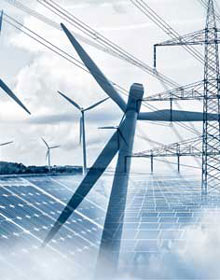
Beijing, China – South Africa is taking significant strides towards revolutionizing its energy sector by harnessing new technologies aimed at producing electricity from cleaner sources. This move promises not only to make electricity more affordable for its citizens but also to contribute to global decarbonization efforts.
“We are moving away from the traditional conception of electricity using wires, which are very expensive. We are using new technologies… and benefit from the rich solar that we have,” stated Dr. Kgosientsho Ramokgopa, South Africa's Minister of Electricity and Energy, during a press briefing in Beijing, China.
Speaking on the sidelines of the South Africa-China Business Forum, Dr. Ramokgopa emphasized the potential for South Africa to learn from global technology leaders like Huawei. “We visited Huawei, a major player in the energy ecosystem for modernisation and the optimisation of energy generation. We are able to use their tools to ensure that we deliver electricity to far-flung rural areas in a manner that is cheaper and incorporates new sources of energy -- in the main, solar PV [photovoltaic] and wind,” he explained.
Dr. Ramokgopa is part of the delegation accompanying President Cyril Ramaphosa on his State Visit to China. The delegation's agenda includes exploring avenues for technological collaboration and investment that could bolster South Africa's energy infrastructure.
South Africa's landscape is abundant with untapped solar and wind resources, particularly in rural areas. However, the challenge has always been the cost and efficiency of harnessing and storing this energy. “What Huawei has done is it has found cheaper ways of storing electricity, even if the sun is not available,” the Minister remarked, highlighting the technological strides that could transform South Africa's energy scenario.

This innovative approach addresses several pressing issues, including energy access and availability. “This will assist us to do away with load reduction, and we have a percentage of our communities that are not connected to electricity. When you look at the prices of electricity, they are prohibitive, but solar and wind are available. These are endowments, which are significantly cheaper,” Dr. Ramokgopa noted.
The shift towards solar PV and wind energy is not only a financial boon but also an environmental imperative. By leveraging these cleaner energy sources, South Africa can make meaningful contributions to its Nationally Determined Contribution (NDC) under the Paris Agreement, which outlines the country's commitments to reducing greenhouse gas emissions.
Moreover, the decentralization of energy production means that communities can play a direct role in generating electricity, reducing dependency on centralized grids. “Because we can get it naturally and it’s cleaner, it also means we are contributing to the [decarbonization commitments made in the] Nationally Determined Contribution (NDC),” the Minister emphasized.
The vision doesn't stop at energy generation. Retrofitting existing electrical infrastructure and connecting unserved areas can spur local manufacturing and employment. “There are a number of communities that are not connected to the grid or don’t have access to electricity, and retrofitting those who have electricity, we can industrialize on the back of this because we need sufficient demand going forward to localize manufacturing solar PV, battery, and inverters,” Dr. Ramokgopa elaborated.
Addressing the broader picture, this initiative is poised to tackle multiple developmental challenges. “We also need to address other issues, such as issues of skills and employment. We are going to address a multiplicity of issues, which are really transformational and developmental in nature,” the Minister concluded.
South Africa's pivot towards clean energy, bolstered by technological partnerships and innovative solutions, holds the promise of a brighter, more sustainable future. By embracing solar and wind energy, the nation aims to not only provide affordable electricity to its citizens but also to position itself as a leader in the global transition to clean energy.


Leave a Comment